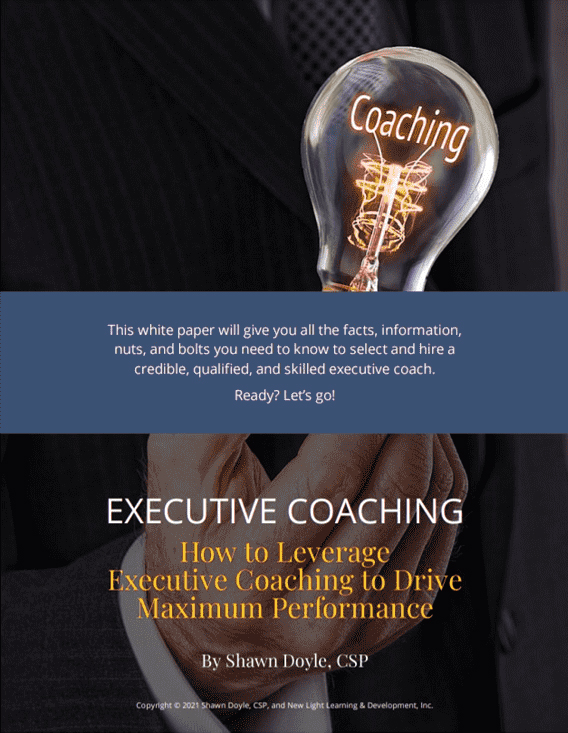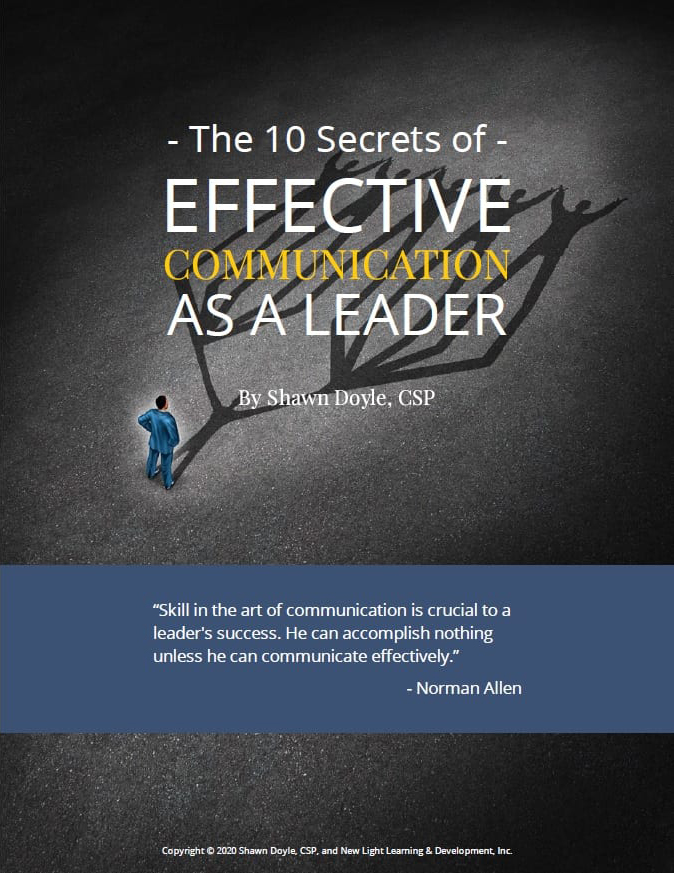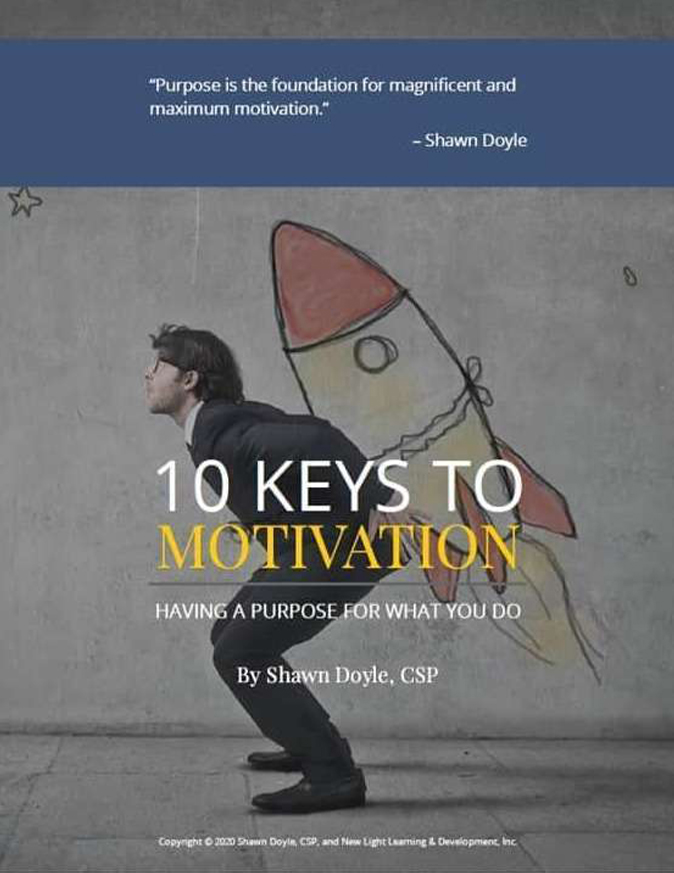Blog

The Power of the Mentor
By Shawn Doyle
I have been lucky enough to have several mentors in my life, and they have had an immeasurable impact on me. Let me repeat – they have had an impact on me that you cannot possibly imagine. Why is it important to have a mentor? I wrote about this in my book Jumpstart Your Motivation; it is important to have a mentor for many reasons:
•You can’t think of everything yourself– As much as you would like to think you can, you can’t think of everything! Many times when you are involved in a situation, you can’t see the forest for the trees. You may be too close to the situation. A mentor has the ability to step back from the action and to review it objectively. Let’s say that you are fighting a battle on the ground- but you have a radio connection to a helicopter high above the action. That is the perspective of your mentor. Secondly they aren’t emotionally involved, so they have the ability to be more objective. Lastly it is the classic “two heads are better than one” approach. Your mentor extraordinaire may come up with ideas that are new and different. I have had mentors who have caused me to think “I wish I would have thought of that!”
•You don’t always have enough experience– Your mentor may have experienced the same situations in the past and have excellent advice on how to handle it. Let me give you an example. My sixteen-year-old daughter is very pretty, in fact she is model pretty! A few years ago she came home from school one day and said “I am ugly because no guys will ask me out.” This was her perception and I was able to share with her my experience. I told her that when I was in the tenth grade and lacked confidence, that I wouldn’t ask pretty girls out because I was intimidated. I know this because I experienced it. The reason guys were not asking her out, is she was too pretty! So that is the advantage that a mentor can provide. There is, as they say, no replacement for experience.
•Two heads are better than one– Have you ever tried to play tennis by yourself? It’s pretty boring, isn’t it? You don’t have anyone to return your volley or to push you to the next level. Having a mentor is similar to having a great partner in tennis- it is someone to bounce ideas around and help improve your game. Having someone to bounce ideas around has for me always resulted in better ideas.
•Navigate the corporate culture– If your mentor is someone who works at your company, they can help you navigate the corporate culture. They can help you understand the different personalities and quirks of each person. Having this kind of guidance can be a great help and make your life easier.
•Save time on your climb– A great way of saving time on your climb up the corporate ladder is to have a mentor. There are people who have already learned what you are learning and have experienced what you are now experiencing. As Brian Tracy, noted author and speaker says- “if you want to be successful, find someone who has already done it and do it the same way they did.”
How To Select A Mentor
Success is more likely if you have a mentor, but the key is to have the right mentor. So how do you select a mentor? Here are some tips on selecting a mentor:
•Find someone who is already successful at what you aspire to do – If it’s in the area that you don’t aspire to then at least make sure it is someone who is highly successful.
•Don’t limit yourself to just one mentor– You can have a mentor for each area of your life. You can have a mentor for your career, for fitness, finances, and for other areas you want to improve in- just make sure you don’t spread yourself too thin. Too many mentors can be just as counterproductive as not having one at all.
• Don’t assume it has to be someone you already know personally– I met Nancy at a training event, and we were discussing mentors and mentoring. I asked her if she had a mentor and she said her mentor was a very famous motivational speaker and author. Stunned, I asked her how this happened. She said that she was at a seminar and at the end went up and asked him, and he said yes! It was a simple as that. Don’t make assumptions about who would or wouldn’t agree to be your mentor. Being a mentor is usually flattering, a slight boost to someone’s ego. You may be surprised as to who will say yes.
•Decide if you want your mentor to be someone from your current organization or from outside the organization– There can certainly be advantages and disadvantages with each. As mentioned earlier, someone from inside your organization can provide tremendous insight, perspective about the organization, and the culture. On the other hand, people can sometimes be at a company for so long they lose perspective. Someone from outside can often provide unique perspective and insight. I once was taking an Amtrak back from a business trip and found myself next to a gentleman from Turkey who was very perceptive. He was asking me questions about American culture, and he also had unique perspectives about “We Americans.” He was able to provide perspective that I was not able to have, but made sense once he said them. A mentor from outside can provide that kind of perspective.
•Try not to pick a mentor that is too much “like you”– We are often most comfortable being around someone who is similar to us in appearance, upbringing or beliefs. I believe a mentor is someone who will help you think outside the lines. If the person who is your mentor is too much like you, then the result will be what I call “group think” which is dangerous. This is when everybody in a group all start to think alike. Be different, pick someone who can give you new fresh perspectives, and challenge your thinking.
The Mentoring Process
If you want to have a mentor, then you want to make sure to get the most out of the process. As a protégé, you must have some kind of process to insure success of the relationship, which is going to be formed.
First, you need to decide what your objective is for that particular mentoring relationship. It is important to ask yourself the following questions:
• Why do I need a mentor for this particular area?
• How can mentoring help me?
• What do I want to achieve short term? Long term?
• What are my strengths?
• What are my areas that need to improve?
• What specific skills can my mentor bring to the table?
• How often should we meet? When? Where?
• How will I know that I am making progress?
Structuring the Mentoring Process
The process of mentoring can either be formal or very informal. I don’t think it matters which, all that matters is what works for each person in the process. Secondly, it is important to be as specific as possible about what you would like to get out of the mentoring. It must be clear to both the mentor and the protégé.
No matter what the style of your mentor, the amount of preparation you put into it will greatly affect the success of the process. Before each meeting, write down or mentally prepare for what you would like to discuss. This makes the time you spend together more productive and meaningful.
The reason you have a mentor is to help you grow, and to help you become more motivated and to stay motivated. Your efforts will affect the quality of the relationship.
The ability to connect with another human being, to really help them, to me is a most noble calling, and the greatest honor in the world.
Lastly, being a mentor, or having a mentor, can have a tremendous impact on your level of motivation. Go for it!
Originally appeared on The Huffington Post
Follow Shawn Doyle on Twitter: www.twitter.com/Motiv8er







